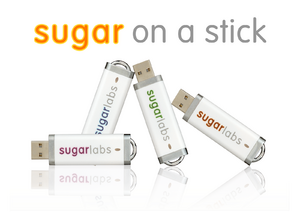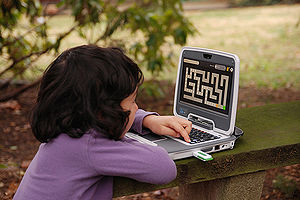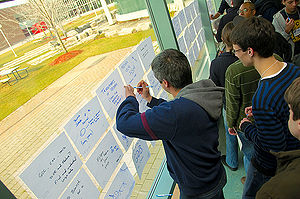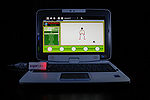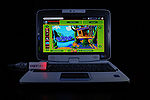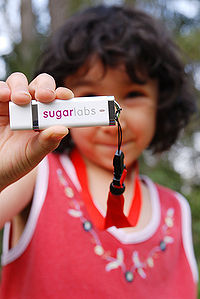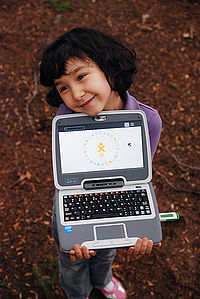Difference between revisions of "Sugar on a Stick"
| Line 10: | Line 10: | ||
|- | |- | ||
| style="border: 0; border-width: 0; width: 350px;" | [[File:SugaronastickMirabelle.png |300px|left|link=http://spins.fedoraproject.org/soas]] | | style="border: 0; border-width: 0; width: 350px;" | [[File:SugaronastickMirabelle.png |300px|left|link=http://spins.fedoraproject.org/soas]] | ||
| − | | style="border: 0; border-width: 0;" | '''[[Sugar on a Stick]]''' is a [http://fedoraproject.org Fedora-based] [[wikipedia:Live USB|Live USB]] operating system featuring the award-winning [[What is Sugar?|Sugar Learning Platform]] and designed to fit on an ordinary USB thumbdrive ("stick"). Learn more about [http://spins.fedoraproject.org/soas/#home the project] and the [http://spins.fedoraproject.org/soas/#about principles] behind it at our [http://spins.fedoraproject.org/soas Spin webpage]. The most recent version is version 3, code-named '''[[Sugar on a Stick/Mirabelle|Mirabelle]]''' and was released on '''May 25, 2010.''' The [[Sugar_on_a_Stick/Installation/Variations#SugarCreationKit_DVD|Sugar Creation Kit]] is a downloadable DVD which includes Mirabelle, previous versions of Sugar on a Stick, Activities for children, documentation, and tools. | + | | style="border: 0; border-width: 0;" | '''[[Sugar on a Stick]]''' is a [http://fedoraproject.org Fedora-based] [[wikipedia:Live USB|Live USB]] operating system featuring the award-winning [[What is Sugar?|Sugar Learning Platform]] and designed to fit on an ordinary USB thumbdrive ("stick"). Learn more about [http://spins.fedoraproject.org/soas/#home the project] and the [http://spins.fedoraproject.org/soas/#about principles] behind it at our [http://spins.fedoraproject.org/soas Spin webpage]. The most recent version is version 3, code-named '''[[Sugar on a Stick/Mirabelle|Mirabelle]]''' and was released on '''May 25, 2010.''' The '''[[Sugar_on_a_Stick/Installation/Variations#SugarCreationKit_DVD|Sugar Creation Kit]]''' is a downloadable DVD which includes Mirabelle, previous versions of Sugar on a Stick, Activities for children, documentation, and tools. |
|} | |} | ||
Revision as of 05:38, 10 June 2010
What is Sugar on a Stick?
| Sugar on a Stick is a Fedora-based Live USB operating system featuring the award-winning Sugar Learning Platform and designed to fit on an ordinary USB thumbdrive ("stick"). Learn more about the project and the principles behind it at our Spin webpage. The most recent version is version 3, code-named Mirabelle and was released on May 25, 2010. The Sugar Creation Kit is a downloadable DVD which includes Mirabelle, previous versions of Sugar on a Stick, Activities for children, documentation, and tools. |
Want to use Sugar on a Stick?
| If you'd like to try out Sugar on a Stick, check out the Sugar on a Stick Spin Page - it's where our software downloads, installation and usage instructions, and support information lives.
After you've tried out Sugar on a Stick, we hope you'll come back here and join our community of contributors to help us make the next release even better. |
Want to contribute to Sugar on a Stick?
|
You're in the right place! This page is a contributors portal to the project, and contains everything you need to get started in becoming part of the Sugar on a Stick community. |
New contributors start here!
Welcome! We're excited that you want to help us bring the Sugar Learning Platform to children around the world. No prior experience with computers or educational technology is required - in fact, we actively encourage a diversity of backgrounds, ages, and perspectives. See the Joining Sugar on a Stick page for instructions on how to get started. You may also want to check out the Sugar on a Stick project page on OpenHatch, or attend one of our Sugar on a Stick meetings.
What can you do?
There are three main ways you can contribute to the Sugar on a Stick community. We work closely with our upstreams, Sugar Labs and the Fedora Project.
Get Activities on the Stick
|
We're always looking for help with all aspects of the Sugar on a Stick release process. Here are a few things you can do:
|
Get Sticks into Schools
|
Deployments all over the world need many different types of help as they work through the Sugar on a Stick deployment process - we need help building resources for all deployments to use, supporting those deployments, and helping new deployments start, as well as gathering stories and feedback from deployments so that we can make the next version of Sugar on a Stick even better. Some things you can do to help:
|
Get Contributors
|
Contributors are the lifeblood of the Sugar on a Stick community - we work hard to bring a playful mindset of teaching, learning, and meaningful work to the children we aim to reach, and we aim to keep that mindset in our own work and community as well. Welcoming and teaching new contributors or all types, building the resources they need, and teaching them how to empower others in their turn is one of the most important things you can do; it is everyone's responsibility to help build our community, one person at a time. Some things you can do:
|
What's happening?
Meetings
We have weekly meetings on IRC - see Sugar on a Stick meetings for more information, including logs from past meetings. Attending a meeting is a great way for newcomers to get started.
Release schedule
Our release schedule is based on the Fedora release schedule. The most recent release was v.3, code-named Mirabelle, shipped on May 25, 2010 and based on the Fedora 13 release schedule. The next Sugar on a Stick version will be based on the Fedora 14 release schedule.
| 2010-05-25 | Sugar on a Stick v.3.0 Mirabelle released |
| Planning & Development Begins | |
| 2010-07-27 | Feature Freeze (all features have to be approved and in a satisfying state.) |
| 2010-08-03 | Alpha Change deadline (all changes will have to be pushed by this time. pending submissions are insufficient.) |
| 2010-08-17 | Alpha Release |
| 2010-09-07 | Beta Change deadline (all changes will have to be pushed by this time. pending submissions are insufficient.) |
| 2010-09-21 | Beta Release |
| 2010-10-12 | Final Freeze (all changes have to be pushed. no further changes permitted.) |
| 2010-10-14 | Compose Release Candidate |
| 2010-10-26 | Sugar on a Stick v.4.0 Final Release |
Contributor stories
To find out what other contributors are doing, check out Planet Sugar Labs, where contributors to Sugar Labs and the Sugar on a Stick project aggregate their blogs. You can also add your own blog to the Planet.
Related work
While the projects listed below are not part of Sugar on a Stick, we watch them closely and try to work with them when possible (or at least we're trying to learn!)
- SugarCreationKit DVD - Complete DVD containing all the resources required to create all 3 versions of Sugar-on-a-Stick without requiring Internet access
- Other portable Sugar distributions - Live USB work based on other Linux distributions.
Previous versions and subpage index
- Sugar on a Stick/10
- Sugar on a Stick/10/hashes
- Sugar on a Stick/Activity Criteria
- Sugar on a Stick/Activity Criteria/Status
- Sugar on a Stick/Archive
- Sugar on a Stick/Avocado
- Sugar on a Stick/Avocado/hashes
- Sugar on a Stick/Beta
- Sugar on a Stick/Blueberry
- Sugar on a Stick/Blueberry/Activities
- Sugar on a Stick/Boot
- Sugar on a Stick/Bugs
- Sugar on a Stick/Coconut
- Sugar on a Stick/Coconut/Virtual machines
- Sugar on a Stick/Coconut/hashes
- Sugar on a Stick/Contacts
- Sugar on a Stick/Customization
- Sugar on a Stick/Documentation SOP
- Sugar on a Stick/Download/hashes
- Sugar on a Stick/Downloads
- Sugar on a Stick/E-Books
- Sugar on a Stick/Essence
- Sugar on a Stick/Explore
- Sugar on a Stick/FAQ
- Sugar on a Stick/Getting Involved
- Sugar on a Stick/Getting Involved/Testing
- Sugar on a Stick/Goals
- Sugar on a Stick/Hardware
- Sugar on a Stick/Installation
- Sugar on a Stick/Installation/OLPC
- Sugar on a Stick/Installation/OLPC/lang-es
- Sugar on a Stick/Installation/OLPC/lang-fr
- Sugar on a Stick/Installation/Variations
- Sugar on a Stick/Installation Process
- Sugar on a Stick/Linux
- Sugar on a Stick/Linux/Installation
- Sugar on a Stick/Linux/Non-compressed Fedora
- Sugar on a Stick/Linux/bootable device
- Sugar on a Stick/Linux/openSUSE
- Sugar on a Stick/Macintosh
- Sugar on a Stick/Mango Lassi
- Sugar on a Stick/Mango Lassi/Virtual machines
- Sugar on a Stick/Meetings
- Sugar on a Stick/Mirabelle
- Sugar on a Stick/Mirabelle/Virtual machines
- Sugar on a Stick/Pancake page
- Sugar on a Stick/Pineapple
- Sugar on a Stick/Pineapple/Virtual machines
- Sugar on a Stick/Pineapple/hashes
- Sugar on a Stick/Proceso de instalacion
- Sugar on a Stick/Project sitemap
- Sugar on a Stick/Proposals
- Sugar on a Stick/Quandong
- Sugar on a Stick/Quandong/Virtual machines
- Sugar on a Stick/Quandong/hashes
- Sugar on a Stick/Raspberry Pi
- Sugar on a Stick/Resources
- Sugar on a Stick/Roadmap
- Sugar on a Stick/Smoke Test
- Sugar on a Stick/Stick Layout
- Sugar on a Stick/Strawberry
- Sugar on a Stick/Subpages
- Sugar on a Stick/Sugar Clone
- Sugar on a Stick/Sugar Clone/lang-es
- Sugar on a Stick/TODO
- Sugar on a Stick/USB format
- Sugar on a Stick/Virtual machines
- Sugar on a Stick/Virtual machines/Archive
- Sugar on a Stick/Windows
- Sugar on a Stick/Windows/lang-es
- Sugar on a Stick/Windows/lang-no
- Sugar on a Stick/ZyX-LiveInstaller
- Sugar on a Stick/deja-dup
- Sugar on a Stick/lang-es
- Sugar on a Stick/previous versions
- Sugar on a Stick/sdm
- Sugar on a Stick/v7
- Sugar on a Stick/ʻŌhelo ʻai
- Sugar on a Stick/ʻŌhelo ʻai/hashes
